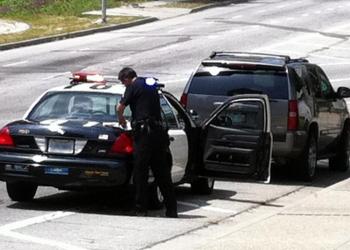
Searches of Vehicles Upon the Arrest of It’s Occupant
With probable cause to believe a person is drunk in public, sitting in his car, the warrantless search of the entire passenger compartment his vehicle looking for open containers of alcohol is lawful under both the “automobile exception” to the search warrant requirement, and as a “search incident to arrest.” The search of the person’s vehicle incident to arrest is lawful when the person has yet to be secured, and/or when it is reasonable to believe the vehicle contains evidence of the offense of arrest. Searching the passenger compartment of an arrestee’s car is not limited by the fact that this particular person has a physical disability that might have precluded him from reaching into parts of the area being searched.
Defendant Tony Ramon Sims was found by two police officers passed out drunk in the front passenger seat of his car at 3:00 a.m., in the parking lot of a downtown San Diego bar that had closed an hour earlier. The keys were in the ignition. The officers woke defendant and engaged him in conversation. When they did so, they noted the odor of alcohol emanating from his person, that he had bloodshot eyes, and that his speech was slurred. As defendant fumbled for his wallet, he appeared as though he was about to vomit. Based on these observations, the officers believed defendant was intoxicated and in violation of section 85.10 of the San Diego Municipal Code (i.e., being under the influence while “in or about any motor vehicle” in a public place.) A records check (done via one of the officer’s cellphone) showed that a person named Tony Sims was on probation and subject to search and seizure conditions. In talking with defendant, it appeared that he was in fact the same Tony Sims referred to (although it was later determined that he was not, and that he was not subject to a Fourth waiver). Deciding to search defendant’s car pursuant to his apparent Fourth waiver, defendant was asked to step out of the car. However, defendant told the officers that because he was paralyzed from the waist down, he couldn’t do so without assistance. So the officers searched the car with defendant still siting in the front seat. The search resulted in the recovery of a loaded semiautomatic handgun from the rear passenger floorboard. After removing defendant from the car and handcuffing him, a further search of the car resulted in the discovery of a second loaded semiautomatic handgun under front passenger seat (where defendant had been sitting) and handgun ammunition on the rear driver’s side floorboard. Defendant was arrested and charged in state court with two counts of the illegal possession of a firearm by a felon (P.C. § 29800(a)(1)) and one count of the unlawful possession of ammunition (P.C. § 30305(a)(1)). Defendant filed a motion to suppress the evidence recovered from his vehicle. Upon denial of his motion, he plead guilty to the charged offenses and was sentenced to three years’ probation. Defendant appealed.





